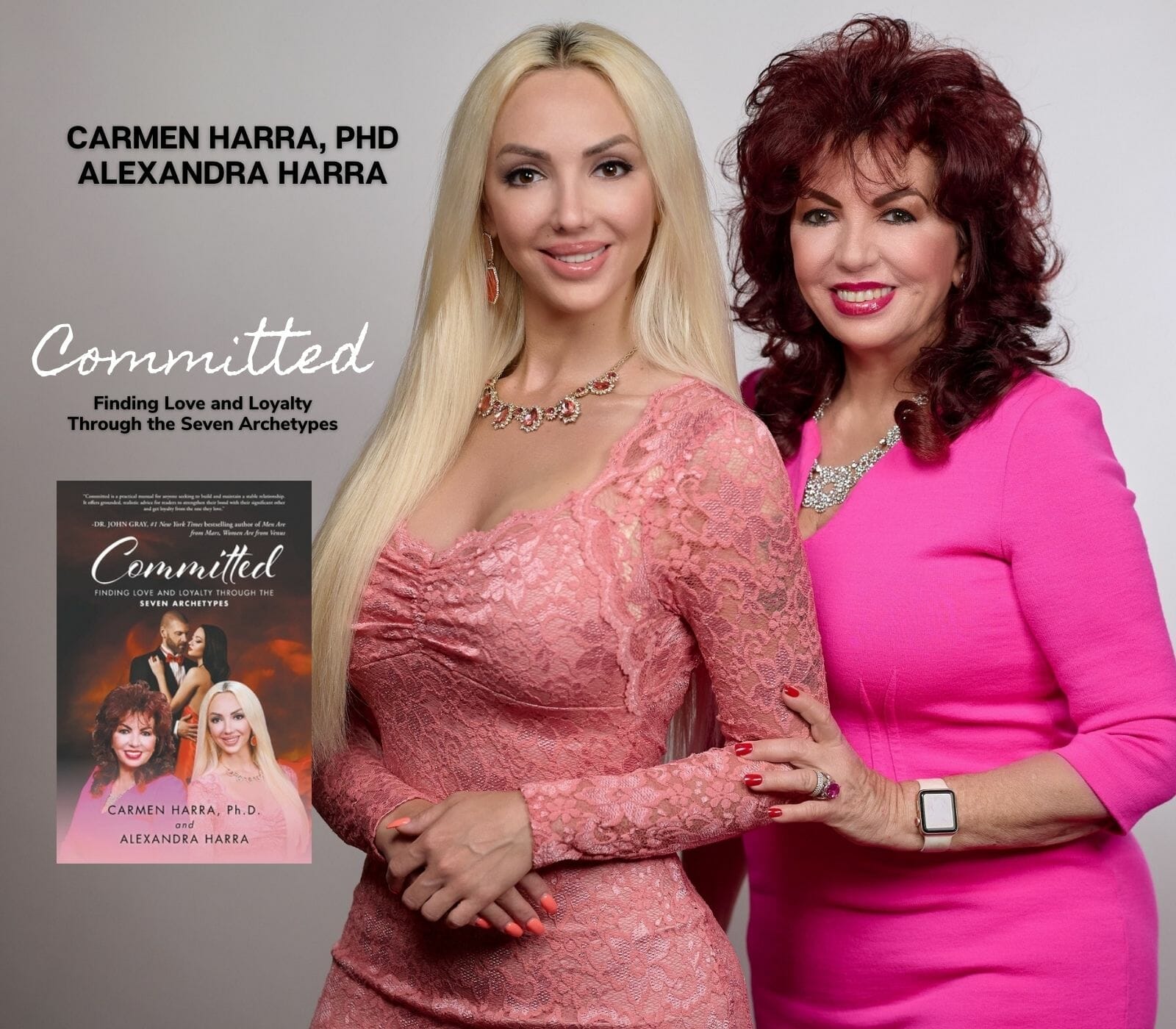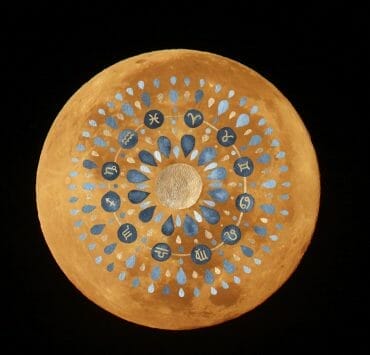Carmen Harra and Alexandra Harra: Love and the Seven Archetypes

Understanding will lend you acceptance: the ability to accept your partner’s faults and flaws and the fact that he won’t always be able to give you what you want. Thirdly, you have to ignite the fire of emotional intimacy and keep it well-lit throughout your relationship. We’ve met many people who live together physically but emotionally. They’re worlds apart! Emotional intimacy is like magic energy that runs between you and keeps you ever-connected. As we like to say, it knows what your partner needs before he gets a chance to ask.
OMTimes: Is it realistic to believe that we can change our partners, or is this just a delusional fantasy we keep telling ourselves?
Carmen Harra: We often want a person to change so badly that we beguile ourselves into thinking we can somehow “fix” them. The hard truth is that no one can change anyone else; we can only change ourselves. However, if you want your partner to change, you can undoubtedly inspire him to improve and usher toward the transformation you’d like him to make.
But ultimately, the decision and work that come with the change are his alone; you cannot walk that road for him. The best way to get another person to change is to alter your behavior. Then, the person will have to respond in one way or another, and when he does, you’ll get a better understanding of his intentions and capacity to change.
OMTimes: What is the relationship between love and Karma, and how can one find equilibrium between these two and develop balance and Commitment in our lives? Is it possible to learn how to love correctly?
Carmen Harra: Unresolved Karma will interrupt your love life. Old Karma is like a neighbor that won’t stop knocking on your door; sooner or later, you’ll have to answer and see what he wants!
Unsettled Karma will creep into your current relationships and make you attract situations that didn’t work out before and people that disappointed you until you take appropriate action and resolve it once and for all. This is why it’s crucial to settle all Karma from the past; if you want to build healthier relationships, you should begin introspecting on your Karma starting today.
We offer the steps to clear away old Karma once and for all in our book. One of the first actions to take is to look into what types of things keep happening to you with honesty and without fear. For example, while there is no way to love correctly, there is a way to love that guarantees the formation of good Karma, and that is to do to your partner what you want to be done to you.
OMTimes: Do you have a book that changed your life? If so, how and which one?
Carmen Harra: The book that changed my life was my first book, Everyday Karma because it brought me the highest joy to hear about how it changed the lives of those who read it. From a young age, I recognized that Karma was the foremost law of the universe. Writing this book gave me the opportunity to share my knowledge on eradicating negative Karma and fostering positive Karma is the secret to a perfect life.
Alexandra Harra: It wasn’t so much a book for me, but I have a special love for Romantic poetry: anything written by Byron, Keats, or Shelley speaks volumes to my spirit. Their works remind me of the divine nature of my soul and also to return to nature. There is something so liberating about Romantic poetry that I memorized several poems, including Ode to a Nightingale.
OMTimes: How do you see the role of the Divine Feminine in this relationship dance? And how (in your view) can the Rebalancing of the Sacred Feminine influence the mystical transformations of our loving relationships?
Carmen Harra: The Divine Feminine is rising in power again, after a long period of being dormant. The male partner needs to recognize his feminine energy as well; as masculine as a man may like to feel, he is still influenced by feminine energy. Men should explore their emotions just as much as women, and we think they’re learning to do that. In the modern world, the rise of the Divine Feminine means more balanced relationships—ones in which power is distributed evenly, and both partners can benefit from the endless gifts the other brings.
OMTimes: What are the seven Archetypes, and would it be possible for someone to embody more than one of the seven archetypes?
Carmen Harra: The seven archetypes are The Independent, The Workaholic, The Narcissist, The Free Spirit, The Hopeless Romantic, the Wounded Warrior, and the Introvert. There also exists an eighth archetype called The Well-Rounded One, which is the ideal we should all strive to become as we break through our mental and emotional barriers. We each have a dominant archetype that dictates much of our personality, but we can also have a recessive archetype that influences how we behave to a lesser degree. For example, someone can be an Independent who displays hints of a Narcissist from time to time or a Hopeless Romantic who also acts on traces of a Wounded Warrior. As we outline in our book, it all depends on how a person chooses to externalize their personality.
OMTimes: What are your personal opinions about online dating? Is it possible to develop Commitment and success in this modern way to forge a loving connection?
Carmen Harra: Online dating is a positive dating tool if used wisely. From our experience, many online daters are looking for entertainment over actual Commitment, but it is possible to develop an authentic, long-term relationship out of online dating.
It all depends on what you put out—that’s what you’ll get back. If you make it known to potential suitors that you’re looking for a serious relationship and nothing short, you can skip over people who aren’t seeking the same. It’s important to scope out online daters who aren’t up for Commitment: those who constantly ask uncomfortable questions, want you to send them risqué photos, or suddenly ghost you. Of course, we should exercise caution and common sense with both online and in-person dating.
OMTimes: How can one rearrange one’s mental abilities, thoughts, beliefs, and actions to foster positive relationships?
Carmen Harra: The first step to rearranging thoughts, beliefs, and actions is to become aware of what you’re thinking and feeling daily; everything begins and ends in the mind, so we must start there. We recommend that our clients keep a daily journal in which they jot down their emotions and figure out their dominant emotions. They might be surprised to learn what they feel most frequently. For example, they might think they’re happy-go-lucky people when in reality, their first thought of the day is pessimistic or counterproductive. We are creatures of habit. So just as we create a habit of drinking coffee every morning, we also create habits of recurring emotions. If our everyday emotions are negative, they’ll not only affect us but those around us: emotions like rage, impatience, intolerance, or contempt are sure ways to ruin relationships. But if we become aware of the presence of these emotions, we can stop them in their tracks. We can intervene by asking ourselves, “Why am I feeling this way today? Is this emotion warranted, or can I replace it with a most positive emotion?” This gives us the ability to control our feelings so that they don’t control us. From there, we can alter the stories we tell ourselves.
We’re all guilty of creating stories in our minds. The brain does this as a defense mechanism. Sometimes, however, the stories we fabricate don’t match reality. In the sequence of thoughts-actions-reality, our stories write the next chapter. That’s because the things we envision in our minds induce energy. And if they’re negative, our stories invite negative energy that manifests in the form of situations, events, and people.
Let’s say your partner isn’t picking up your calls. Depending on your previous experiences with him, you might start to think he’s mad at you, with “someone else,” or in trouble. You begin to flesh out these thoughts, adding details such as what the other person looks like or even planning your imminent breakup. If you dread the outcome of something, you might concoct a story that involves the worst possible scenario so that if the worst does transpire, at least you’re prepared.
In reality, the only thing this does is afflict your mental health and propel more doubt and desperation. The next time you find yourself creating disadvantageous stories, stop your thoughts, return to the present, and apply logic. Examine what’s making you imagine bad things: is it a former trauma, a tendency to be pessimistic, etc.?
Remind yourself that these things haven’t happened and don’t need to happen. Then, distract yourself by getting out of your head.
Pick up a book, read a random article, or learn about a new topic. Then, when you feel calmer, close your eyes and start the story again. Please go through the scenes and modify them to benefit you. Alter your stories regularly to regain emotional control and foster positive relationships.
Committed: Finding Love and Loyalty Through the Seven Archetypes
What is commitment and why is it so hard to achieve? We’ve all struggled in love, but if you picked up this book, it means you’re ready to end cycles of pain and disappointment and foster a truly fulfilling relationship.
Committed will make you reevaluate the way you think about love. It is a relationship manual that unfolds in two parts: the work you’ll need to perform on the inside and the seven distinct archetypes you’ll encounter on the outside.
Follow Dr. Harra On Facebook, On Twitter, On HuffPost, or Youtube
OMTimes is the first and only Spiritually Conscious Magazine. Follow Us On Facebook, Twitter, Instagram, Linkedin, Pinterest, and Youtube
OMTimes Magazine is one of the leading on-line content providers of positivity, wellness and personal empowerment. OMTimes Magazine - Co-Creating a More Conscious Reality







